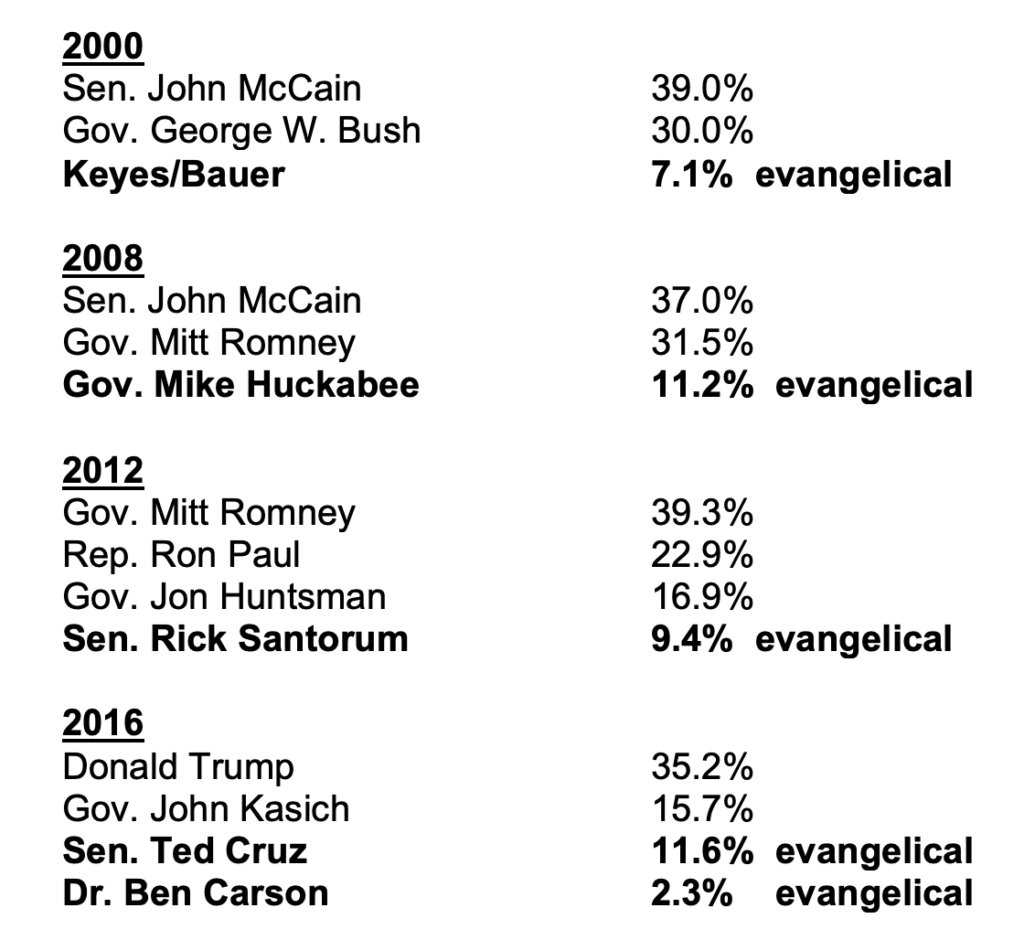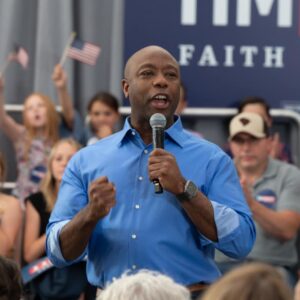When state Rep. Michael Moffett was contacted by U.S. Sen. Tim Scott’s political team to help kick off a town hall at the New Hampshire Institute of Politics, it had an unusual request: Could he also offer the opening prayer?
“I’ve never been asked to give a prayer like this,” Moffett confessed to the town hall crowd before delivering a brief prayer to the bemused audience.
Moffett, who represents Canterbury and Loudon, told NHJournal afterward he didn’t mind the prayer and said he didn’t think the Republicans in attendance did, either. But, he acknowledged, politics and religion don’t blend in the Granite State the same way they do in some other states.
“He’s fine running as a person of faith as long as he doesn’t lead with it,” Moffett said.
Perhaps. But for an outspoken evangelical running a “Faith In America” presidential campaign like Scott, recent political history in New Hampshire isn’t promising.
In 1988, televangelist Pat Robertson shocked GOP pundits with his second-place finish in the Iowa caucuses. Sen. Bob Dole from neighboring Kansas won 37 percent of the vote, and Robertson collected 25 percent, while presumed frontrunner George H.W. Bush got just 19 percent — “a humiliation for Mr. Bush, who until now has led the Republican presidential field in virtually all national polls,” The New York Times reported.
But just eight days later, Robertson came to New Hampshire and couldn’t crack double digits. He won nine percent of the vote, while Bush took 38 percent.
Robertson’s campaign never recovered. He finished third in the Christian Coalition stronghold of South Carolina and quickly faded soon after.
Following in Robertson’s “values voters” footsteps were Alan Keyes, Gary Bauer, Gov. Mike Huckabee, Sen. Rick Santorum, Dr. Ben Carson, and Sen. Ted Cruz. All of them either openly embraced their evangelical politics or were embraced by born-again voters.
And they all lost New Hampshire.
With the exception of conservative firebrand Pat Buchanan, the “Religious Right” candidate in every New Hampshire GOP primary since 1988 has averaged around 10 percent or so of the vote.

By some measures, New Hampshire is the least religious state in the union. A 2016 Gallup poll found just 20 percent of Granite Staters identified as “very religious,” about half the national average. And the state has the second-lowest weekly church service attendance rate, too.
With a largely secular electorate and a popular Republican governor who touts that he is pro-choice, is there a place in the New Hampshire primary for Scott, whose campaign events are sprinkled with shouts of “Amen!” and who frequently quotes Holy Scripture on stage?
“I think the Faith in America tour — certainly we all should celebrate the foundation of this country being a Judeo-Christian foundation, that’s just historically factual — but the Faith in America tour has really focused on faith in each other,” Scott told the AP when asked about the issue. “Part of the message that I’m trying to share with the American people — it’s not that we should all be of the same faith because frankly, it’s the Judeo-Christian Foundation that allows you to practice and worship the God of your choice or none at all.
“But what we all should agree on is that we should have faith beyond ourselves. Faith in each other is beyond ourselves. Faith in the future of America is beyond ourselves,” Scott said.
Veteran GOP strategist Michael Dennehy said there is definitely a path for Scott, and he believes the evangelical vote could provide the South Carolinian a base from which he could potentially expand his support.
“I have always believed there is a significant evangelical vote in New Hampshire,” Dennehy said. “These voters are not easy to motivate as a bloc because it takes experienced groundwork from within that community. However, it does provide a tremendous opportunity for a candidate for president.”
Dennehy notes exit polls from the 2016 GOP presidential primary found about one-quarter of participants identified as evangelicals. Interestingly, their top pick wasn’t Cruz (24 percent) but Donald Trump (28 percent).
That is another challenge for Scott: While values voters may see a kindred spirit in his candidacy, those same voters overwhelmingly backed Trump — even after the release of the NBC tape with his crude language and news of his sexual relationships with a porn star. Values may not be enough to get these voters, particularly in a secular state like New Hampshire.
Shannon McGinley, executive director of Cornerstone Action and Cornerstone Policy Research, was more optimistic.
“Huckabee and Santorum gained some traction whilere running in New Hampshire,” McGinley said. “I think it is all about the candidate – how they campaign, their messaging, how they connect with voters, and how hard they work.”
McGinley’s organizations are nonprofit Christian advocacy groups focused on public policy around protecting life, promoting parents’ rights, and defending religious freedom. Moffett believes some of those issues strongly overlap with more typical New Hampshire GOP voters.
“Look at the issue of parents’ rights. That’s an issue that resonates both with voters of faith and more secular voters as well. It motivates homeschoolers and parents who send their kids to parochial school, sure. But it’s also important to family-oriented suburbanites who may not attend church but they’re very focused on their kids’ school and who are worried about government overreach.
One issue nobody in the GOP is talking up as a selling point, even in the primary: Abortion.
Until the GOP majority pushed through a late-term ban in 2021, the total number of restrictions on abortion in New Hampshire was zero. Unrestricted abortion for any reason up to the day of birth. Thanks to the influence of Planned Parenthood and the pro-choice culture, abortion moderates haven’t even been able to pass a law to track the number of the procedures conducted in the state, or at what point in the pregnancy.
When the Democrats came within a couple of seats of taking back the House in 2022, many Republican lawmakers blamed the Dobbs decision and their Democrats’ attacks on the state’s new 24-week limit.
Gov. Chris Sununu, considering his own White House run, has repeatedly declared the pro-life position a “loser.”
This is yet another advantage for Donald Trump, who has been careful to remain pliable on the abortion issue, and a challenge for candidates like Scott and Gov. Ron DeSantis.
During an April visit to New Hampshire, Scott said a federal abortion ban at 20 weeks “makes total sense to me.”
McGinley doesn’t think Scott’s open discussion of his faith will prevent him from getting a fair hearing in New Hampshire.
“I believe the electorate in the 603 will look beyond labels that those on the outside assign and give these candidates a fair chance to have their tires kicked,” McGinley said.



